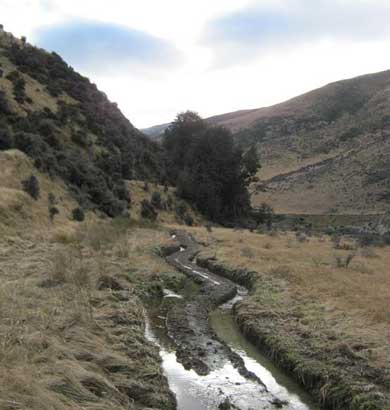Archived content: This media release was accurate on the date of publication.
Date: 08 August 2018
DOC has recently been following up reports of our backcountry falling foul of four wheel drivers. Compliance rangers found extensive damage to parts of the magnificent Eyre Creek and Mavora Lakes tracks.

Extensive damage to a wetland on Eyre Creek
Image: DOC
DOC compliance lead for Murihiku Phil Melgren, himself a keen four-wheel drive enthusiast, says it’s frustrating a small number of drivers are being thoughtless.
“I love four-wheel driving. It gets me to otherwise inaccessible places which are truly magical. However, there appears to be a small number of people who are not being considerate in their use of these areas.”
And it’s not just a one off, Phil Melgren says.
“The Bog Hole near Carey’s Hut at Mavora Lakes is well known for being regularly torn up. Continual damage means these precious areas cannot repair themselves.”
Private land along access roads has also been damaged which could put access arrangements at risk, Phil Melgren says.
Whilst DOC and the police are investigating this latest incident, DOC is calling for 4WD users in Fiordland and Southland to behave responsibly and respect the natural environment so that everyone can enjoy it.
Following the four-wheel drive code of care means that everyone in this keen and mostly responsible user group can continue to enjoy our backcountry, Phil Melgren says.
“Ensure that you’re driving where you’re allowed to, stay on the track and keep damage to the environment to a minimum.”
Four-wheel driving code
Follow the four-wheel drive code of conduct to protect the environment and for the long-term sustainability of off-road driving.
- Avoid sensitive areas. Alpine landscapes, swamps, waterways, sand dunes and river beds are easily damaged by vehicles.
- Abide by the laws and regulations covering all vehicles and drivers.
- Stay on roads. Avoid widening them.
- Keep the environment clean. Take all your rubbish with you.
- Respect wildlife, look but don’t disturb. Keep your distance.
- Find out if a permit is required for access. If your trip crosses private land obtain permission.
- Leave gates as you find them.
- Always thoroughly clean your vehicle before and after trips to minimise spreading weeds and diseases.
- Respect the right of others for quiet enjoyment. Avoid noisy driving. Give way to walkers, cyclists, horse riders and others.
- Be prepared for the unexpected. Drive at a speed which will allow you to stop if a hazard arises.
- If winching is necessary, use another vehicle. If you must use a tree. use webbing or padding to prevent damage to the tree.
- Cross waterways with care. Use designated crossings where possible.